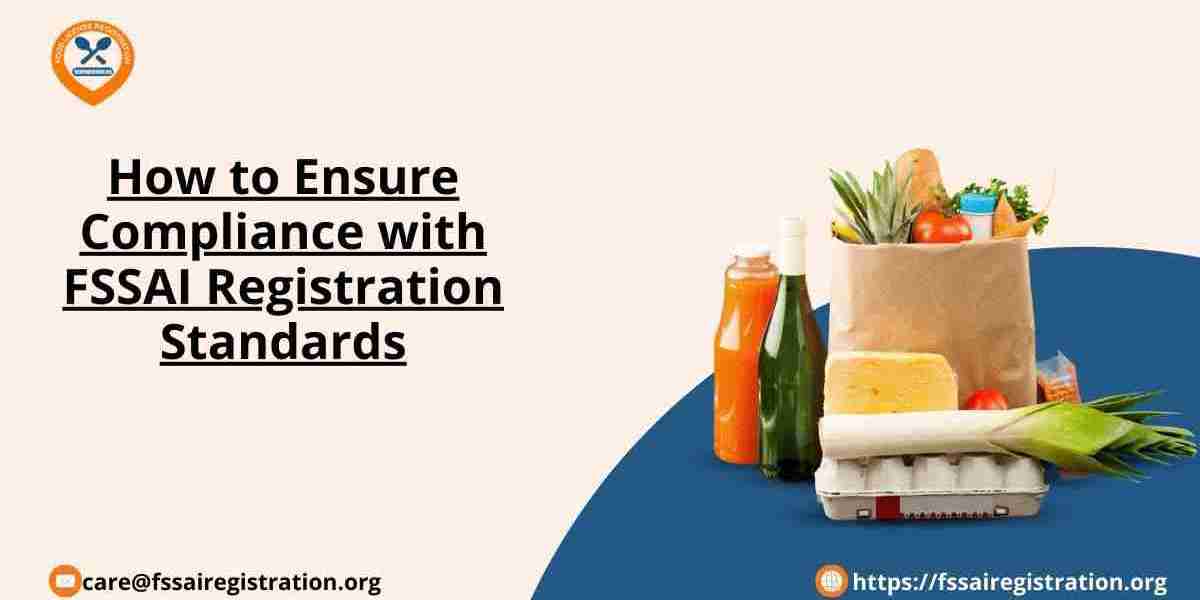Introduction
For businesses operating in India’s food industry, compliance with FSSAI (Food Safety and Standards Authority of India) registration standards isn’t just a legal obligation—it’s a critical part of ensuring consumer safety, building trust, and maintaining a successful operation. From food manufacturers and restaurants to small vendors and home-based food businesses, adhering to these standards helps deliver high-quality products, maintain transparency, and avoid penalties that could harm your brand reputation. In this blog, we’ll outline the essential steps to ensure compliance with FSSAI registration standards, offering practical guidance on how food businesses can meet and maintain the required benchmarks.
Understand the FSSAI Requirements
Before you can achieve compliance, you need to fully understand the FSSAI registration and licensing requirements that apply to your business. These vary based on factors such as the scale of operations, the nature of the food products, and the location of your business.
FSSAI offers three levels of compliance:
Basic Registration: For small-scale operators with limited turnover (up to ₹12 lakh annually).
State License: For mid-sized businesses with turnover between ₹12 lakh and ₹20 crore, or those operating within a single state.
Central License: For larger businesses, export-oriented units, and multi-state operations, or those with turnover exceeding ₹20 crore.
Determining the correct category for your business is the first step toward compliance.
Complete the Necessary Documentation
Once you know which registration or license applies to your business, gather the necessary documents. Typical requirements include:
Proof of identity and address of the business owner.
Proof of premises ownership or lease agreement.
Details of the food products you manufacture, process, or sell.
A food safety management plan (if applicable).
Certificate of incorporation or partnership deed for companies.
Ensuring your documentation is accurate, up-to-date, and complete is critical. Any discrepancies can delay the approval process or result in penalties later on.
Implement a Food Safety Management System (FSMS)
An effective FSMS is at the heart of FSSAI compliance. This system outlines the procedures and protocols your business follows to ensure food safety at every stage of production, storage, and distribution. Key components of a robust FSMS include:
Good Manufacturing Practices (GMP): Maintain a clean, hygienic facility, ensure proper handling of raw materials, and regularly inspect equipment.
Good Hygiene Practices (GHP): Train staff on personal hygiene, sanitation procedures, and safe food handling practices.
Hazard Analysis and Critical Control Points (HACCP): Identify potential food safety hazards, establish control measures, and regularly monitor these critical points.
By integrating these elements into your daily operations, you not only comply with FSSAI standards but also build a culture of food safety that benefits both your customers and your business.
Regular Staff Training and Awareness
Compliance is a team effort, and your employees play a pivotal role. Conduct regular training sessions to ensure that every staff member understands FSSAI requirements and knows how to implement them. Training topics should include:
Proper cleaning and sanitation techniques.
Safe food storage practices, including temperature control and labeling.
The importance of personal hygiene, such as handwashing and wearing protective gear.
Correct handling of raw and cooked foods to prevent cross-contamination.
Keeping your team informed and motivated fosters a proactive approach to compliance and reduces the risk of violations.
Maintain Detailed Records and Documentation
FSSAI requires businesses to keep accurate records of their operations. This documentation not only supports your compliance efforts but also serves as evidence during audits or inspections. Key records to maintain include:
Daily production logs and batch numbers.
Supplier and vendor details.
Storage and inventory logs.
Cleaning schedules and maintenance records.
Employee training records and certifications.
Organized and readily accessible documentation can significantly streamline the inspection process, making it easier to demonstrate your commitment to compliance.
Conduct Regular Internal Audits
Internal audits are a proactive way to ensure ongoing compliance with FSSAI standards. Periodically review your processes, equipment, and facilities to identify potential issues before they become violations. Check whether:
All food safety protocols are being followed consistently.
Storage and transportation conditions meet FSSAI guidelines.
Staff members are adhering to hygiene and safety standards.
Proper labels and expiry dates are displayed on all products.
By performing these audits, you can catch and address problems early, ensuring that your operations remain compliant.
Stay Updated on Regulatory Changes
FSSAI regulations evolve to address new food safety challenges and consumer concerns. To maintain compliance, it’s essential to stay informed about these updates.
Subscribe to official FSSAI newsletters or notifications.
Attend industry workshops, seminars, or webinars on food safety standards.
Consult with compliance experts or legal advisors to ensure you’re aware of any new requirements.
Remaining up-to-date allows you to adjust your operations quickly and maintain a consistent level of compliance.
Promptly Renew Your Registration or License
FSSAI registration and licenses are not permanent; they must be renewed periodically. Keep track of renewal deadlines to avoid lapses in compliance. A registration lapse could result in fines, penalties, or even a temporary suspension of operations. Submit your renewal application well in advance, ensuring that all documentation is accurate and that your FSMS is current. Proactively managing this process helps maintain uninterrupted compliance and reinforces your commitment to quality.
Suggested read: FSSAI license registration for Restaurants
Conclusion
Ensuring compliance with FSSAI registration standards is not just about meeting legal requirements—it’s about protecting consumers, building trust, and fostering long-term business success. By understanding the registration process, implementing robust safety systems, training your staff, and staying informed about regulatory changes, you can maintain compliance and set your food business on a solid path to growth. With a strong commitment to food safety and quality, FSSAI compliance becomes a seamless part of your daily operations, helping you earn customer loyalty and strengthen your reputation in the competitive food industry.














